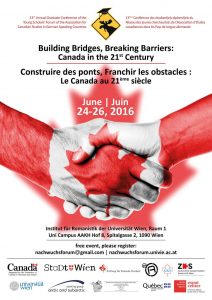13th Graduate Student Conference of the Young Scholars‘ Forum of the Association for Canadian Studies in German-Speaking Countries, University of Vienna (A), June 24-26, 2016
 In May 2014, Austrian drag artist Conchita Wurst won the 59th Eurovision Song Contest and set in motion a wave of responses resonating beyond the borders of the country. In only one year, Conchita – by now the so-called “Queen of Austria” (ORF) and the “queer star on the European horizon” (The Guardian) – has transformed into an icon, not only of pop culture, but first and foremost of tolerance, diversity, respect, and freedom as she continues to promote the 2015 contest’s motto “Building Bridges.” Her anti-discrimination campaign has increased awareness of the necessity for change on social, cultural, and political levels, and has encouraged new debates about human rights, not only in Europe, but on a global scale. As such, CTV’s Canada AM has argued that just as Eurovision is about more than songs, Conchita’s message concerns more than Austria. Her message transcends the borders of Europe and continues to impact even Canadians, who are struggling with current affairs such as the refugee and asylum seeker debates, which have dominated even Canada’s federal election campaigns this fall. Mirroring the increasingly difficult situation Europe has been facing, this reflects Canada’s ongoing status as a space of encounters and multiculturalism, but also of separatism and (neo)colonial policies.
In May 2014, Austrian drag artist Conchita Wurst won the 59th Eurovision Song Contest and set in motion a wave of responses resonating beyond the borders of the country. In only one year, Conchita – by now the so-called “Queen of Austria” (ORF) and the “queer star on the European horizon” (The Guardian) – has transformed into an icon, not only of pop culture, but first and foremost of tolerance, diversity, respect, and freedom as she continues to promote the 2015 contest’s motto “Building Bridges.” Her anti-discrimination campaign has increased awareness of the necessity for change on social, cultural, and political levels, and has encouraged new debates about human rights, not only in Europe, but on a global scale. As such, CTV’s Canada AM has argued that just as Eurovision is about more than songs, Conchita’s message concerns more than Austria. Her message transcends the borders of Europe and continues to impact even Canadians, who are struggling with current affairs such as the refugee and asylum seeker debates, which have dominated even Canada’s federal election campaigns this fall. Mirroring the increasingly difficult situation Europe has been facing, this reflects Canada’s ongoing status as a space of encounters and multiculturalism, but also of separatism and (neo)colonial policies.
The 13th graduate student conference of the Young Scholars’ Forum taking place in Vienna in 2016 is thus titled “Building Bridges, Breaking Barriers: Canada in the 21st Century.” It aims at exploring Canada’s cross-cultural and transnational dimensions; the realities of its histories, geographies, cultures, politics, and, above all, its people and identities, that have shaped and transformed it into its current state as a multicultural dominion a mari usque ad mare (“from sea to sea”).
Topics and disciplines to be addressed (in English and French) will include:
- (Im)Migration, Integration, Refugee & Asylum-Seeker Debates
- Anglo- and Francophone Canadian Literatures & Cultures
- Indigenous Studies
- Multiculturalism
- Gender & Queer Studies
- Media & Film Studies, Visual Culture
- Anthropology, (Ethno)History, Geography, Politics & Economics
- Language, Linguistics & Translation
- Canada/Québec and the World
Please find further information on the conference program, registration, location etc. on the conference website.


